SUMMARY/CONTENT
- Executive Director’s message.
- Brief about Yobe and Project sites.
- Description of organization.
- Activities Strategies used.
- Projects Realized in the Scope of Programs, 2019/2020.
- LIVIA Peace House.
- Financial Statement/ Performance/Assets
- Challenges and Lessons Learned.
- Acknowledging our Institutional, technical, implementing partners.
MESSAGE FROM THE EXECUTIVE DIRECTOR
Dear Friends and Partners,
With a thankful heart, I present to you the 2019-2020 annual report of Hope interactive (HI). 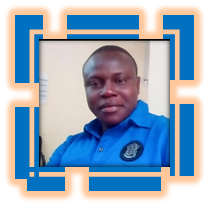 It is a moment to reflect upon the hard work of our staff to ensure delivery of services and implementation of activities within the fiscal year despite the security challenge and public health emergency. We are greatly honored to have worked in Damaturu, Potiskum, Fune, Geidam and Gujba LGAs of Yobe state focusing on peace building, CVE, OVC, humanitarian and development projects. In the last quarter of 2019, the security situation worsened, with ISIS-WA on the north (Geidam/Yunusari axis) and Shekau on the south (Gujba/Gulani axis), which made project implementation a bit difficult. However, with careful planning, HI was able to implement every beat of activity as planned.
It is a moment to reflect upon the hard work of our staff to ensure delivery of services and implementation of activities within the fiscal year despite the security challenge and public health emergency. We are greatly honored to have worked in Damaturu, Potiskum, Fune, Geidam and Gujba LGAs of Yobe state focusing on peace building, CVE, OVC, humanitarian and development projects. In the last quarter of 2019, the security situation worsened, with ISIS-WA on the north (Geidam/Yunusari axis) and Shekau on the south (Gujba/Gulani axis), which made project implementation a bit difficult. However, with careful planning, HI was able to implement every beat of activity as planned.
Hope Interactive made a couple of strides in capacity building for community members, dowsing community tensions, supporting community projects through NYSC CDS groups/individuals, implementations of youth peace community projects and construction of LIVIA peace house, which houses Janet Adama Mohammed multipurpose hall and Daniel Tucker conference hall, which is reminiscent of the Livia peace award geared towards promotion of dialogue, mediation, creation of listening/safe spaces, counseling of at risk youth and conflict resolution.
The covid-19 pandemic emerged and slowed down activity implementation. However, because Yobe state was not locked down completely, activity implementation was scaled and slowed down to ensure that staffs are well protected. Hope interactive provided all of its five teams with a hand wash station and ensured the use of digital infrared thermometers, hand gloves, face masks and practicing of social distancing.
Hope Interactive had the privilege of completing phase two of its project known as “Peace by the people”, funded by the Federal foreign office (FFO), Republic of Germany. Special thanks to the FFO and CR for such a robust support. We afterwards conducted an independent evaluation of the project which overall was mind blowing. This is perhaps the largest peace building project implemented in the state and possibly the northeast. A hybrid of community youth projects and peace building initiative was unique and provided a wonderful blend of activities that further concretized community cohesion and trust building. Secondly, Hope Interactive officially completed its project known as Northeast Humanitarian consortium, which was a self-funded project and has been impacted vulnerable women and children in Yobe and Adamawa states respectively.
Hope Interactive has worked with MDA’s, traditional and religious leaders, gate keepers, duty bearers to conduct research, dialogues, advocacies, mediations, symposiums/colloquiums, policy events, validation and consultative workshops, outreaches, street walks/sensitization, campaigns, youth networking, call-in radio programs, TV talk shows, youth-led peace learning exchange; mentoring, protection and legal support for vulnerable children, educational support, health/hygiene sensitization, capacity building on life skills; trauma healing through arts (Musical art, theater arts and fine arts) through which we have reached out to over 55,000 citizens ranging from young people (male and female), men, women and children.
We remain resolutely committed to end thirst and hunger, to conquer poverty and disease, to banish illiteracy and massive human misery through building peace and providing humanity with the right to life with dignity.
Map of Yobe state showing Hope Interactive’s project sites/locations in red
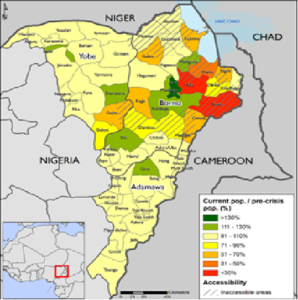
Brief About Yobe State
Yobe, state, northeastern Nigeria borders the Republic of Niger to the north and the Nigerian states of Borno to the east, Gombe to the southwest, Bauchi to the west, and Jigawa to the northwest. Yobe state was created in 1991 from the western half of Borno state.
Yobe’s terrain consists of plains that are drained by the seasonal Komadugu Yobe River and its tributaries in the north and by the Gongola River in the south. The state’s vegetation is predominantly of the Sudan savanna type, with scattered acacia trees. There is also an area of Sahel savanna, consisting of sandy soils and thorn scrub, which is located in the far north. The Kanuri are the principal ethnic group in the state. Sorghum, millet, peanuts (groundnuts), cowpeas, corn (maize), sesame, and cotton are the primary crops. Cattle herding and farming are the chief occupations. Damaturu is the state capital, and Nguru, Potiskum, and Gashua are sizable market towns. The state is served by trunk roads connecting Potiskum, Damaturu, and Maiduguri (in Borno state) with a Population of (2006) 2,321,591.
Context
Humanitarian:
Humanitarian needs in Yobe State increased marginally during the reporting period, mainly as a result of an upsurge in attacks by non-state armed groups (NSAG) and clashes between them and government forces displacing local populations. Hazards affecting civilian populations include improvised explosive devices and unexploded ordinance, flash flooding, and COVID-19 pandemic. Flash flooding and windstorms destroyed
nearly 400 houses, six public facilities and claimed at least eight lives across the LGAs during the reporting period marking the onset of the rainy season. (OCHA 30th June, 2020)
Conflict dynamics:
Conflict continued in Yobe State, including NSAG attacks and clashes with government forces along the LGAs of Geidam and Gujba, bordering Borno State. The security situation in these LGAs remains unpredictable and volatile. Government forces continue to carry out operations and maintain a high level of alertness following NSAG activities across border LGAs. There is a significant increase in the threats of attacks on both civilian and military convoys, abduction/kidnapping (at illegal vehicle checkpoints), and IEDs along these routes. UXOs also pose a threat, with incidents reported in June in Gujba LGA, with the police issuing warning of widespread threats across the LGAs, particularly across farming areas. NSAG attacks were targeting civilian communities across Bursari, Geidam, Gujba LGAs, and abductions in Lantewa, Tarmuwa LGA along the Damaturu – Babangida road. An attack in Buni Gari (27/04/2020), Gujba LGA, resulted in the burning down of activity centers of some humanitarian actors in the community, which triggered a temporary suspension of operations. A similar attack was recorded in Dapchi, Bursari LGA (18/05/2020), where NSAG operatives burned down houses and public buildings, and also looted medical supplies from the health facility. Aid operations in Geidam LGA (19/05/2020) also recorded some disruptions following a spike in NSAG attacks and clashes. (OCHA 30th June, 2020)
DESCRIPTION OF THE ORGANIZATION
1.1 About Hope Interactive (HI)
Founded in 2001, Hope Interactive is a Non-Governmental Organization established basically to combat abject poverty by promoting an environment for sustainable human development. It is popularly known with the acronym (HI) and primarily focuses in various life changing programmes for poor neighborhoods wherever there is a need.
1.2 Our Work
We work to end extreme poverty and enable resilient, democratic societies to realize their potential through promoting quality of life of young men, women and other vulnerable groups at the community level.
1.3 Partnerships
Partnership is paramount in achieving progress to human and infrastructure development. Hope Interactive over the years have successfully implemented many programme with I/NGOs and agencies such as CR, SIDA, HD/BIT/ETH Zurich, NED, ACOMIN/CRS, BC, NERI, DFID.
1.4 Our Vision
Our vision amongst others is to promote a healthy, fair and sustainable future for all the people of Nigeria by alleviating poverty and improving the quality of life through capacity building in various spheres of human development.
1.5 Mission Statement
Hope Interactive is committed to the promotion of innovative approach to positive human development, and behavior pattern through interaction and exchange of values and ideas.
1.6 Objectives
- To raise the profile of faith-based organizations, community-based organization, and local NGO’s to be efficient in grass root education, networking capabilities and building reliable partnership.
- To conduct research and advocacy on the political, economic, social and cultural issues that relate to human development.
- To provide a forum where by community leaders, citizens, politicians and other groups from any part of the world to work together by exchanging ideas, training and interdisciplinary experts’ meetings on specific themes.
- To provide for the exchange of learning experience and idea in development between the public, private and local sectors, through workshops and seminars
1.7 Our Activities
- Women and youth empowerment
- OVC programming
- Management capacity building
- Preventing/Countering violence and extremism (P/CVE)
- Peace-building and mediation
- Training and capacity building in conflict management
- Integrated youth vocational skill development
- Agricultural and rural development
- Educational development
- Conservation of environment
- Designing and improving local health services delivery system
- Human rights defense; protection and legal support
1.8 Strategies used
- Advocacy
- Media
- Capacity building
- BCC/IEC
- Community Mobilization
- Economic Empowerment
- Collaboration and Partnership
- Facility and Community Systems Strengthening
- Impact Assessment
- Research and Publications
This creates an avenue to work at grassroots with local communities with a view to help them identify their own needs. The idea also encourages local ownership of projects, mobilize the populace for implementation of projects, raise profiles of community-based organizations, and other local NGO’s.
2.0 Our contacts
2.1 North-east Zonal Coordinator & Executive Director [MSHELIA W. BIRMA]
Yobe Office: No. 3, Malari bye-pass, behind ECWA Good news church, Damaturu, Yobe State, Nige
Phone no.: +234-8065658943 Email: msheliawayutabirma34@gmail.com
2.2 North West Zonal Coordinator & Executive Director [DANLADI AMA BARKA]
Kaduna Office: No.5, Hanwa new extension, off Zaria-Kaduna express road, Zaria, Kaduna State Nigeria
Phone no. : +234-8036126611 Email: amayankur@yahoo.com
3.0 Projects Realized in the Scope of Programmes
3.1 NED/CR: Ra’ayin Mata: The voice of women in Northeast Nigeria (January 2020; STATUS: Ongoing)
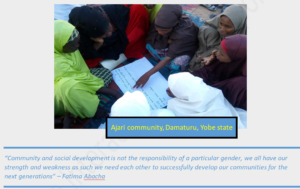
Whilst everyone’s life in northeast Nigeria has been affected by the widespread violence for the past ten years, people’s experiences have varied across all aspects of an individual’s social identity (ethnicity, religion, socio-economic status, age, (dis)ability, sexual orientation or gender). However, experiences of the conflict have particularly differed along gendered lines.
The marginalization of women therefore, makes them vulnerable to being drawn into the violence as it can be viewed as an opportunity to advance their freedoms and reduce their family’s hardship. Many women have legitimate grievances, and without access to productive and peaceful forums to raise and resolve their concerns, violent pathways can seem like an attractive, if not the only, means to demand change. Furthermore, the growing mistrust and suspicion of women as potential sources of insecurity only serves to further ostracize them making them even more vulnerable to being mobilized to undertake violence.
Project Objectives
- Traditional and state power holders (usually elite male) are more receptive to incorporating the concerns and needs of women in the design and implementation of their intervention strategies increasing the prospect of more effective and appropriate security responses at the community, LGA and state level.
- Women in vulnerable communities are empowered with the confidence, skills and opportunities to articulate their experiences, concerns and needs; and use these as a basis to engage with community leaders, religious leaders and security actors for change.
Output/Outcome:
Formation of a network; Women for Peace (WFP) to support mothers to mentor young girls and empowering at risk girls and the community at large in Yobe State.
3.2 Building the capacity of youth to prevent and respond positively to violence: Peace by the People: Formation of YPP (STATUS: Completed)

Peace by the People: strengthening the capacity of youth to prevent and respond to violent conflict in northeast Nigeria.
OBJECTIVES
- Creation of a youth network committed to pursuing non-violent alternatives
- Family, community leaders, local government, security officials and young people have the space to engage constructively on the challenges they face.
- Civil society has the capacity and resources to (i) accompany youth and the community (ii) engage proactively with duty bearers.
In Yobe State, youth are identified as the premise for lasting peace and subsequent sustainability of tranquility in our society. This is because they are the ones who will transform their communities into a more secure and productive neighborhood. To these courses, Hope Interactive with support from Conciliation Resources is implementing a project “peace by the people” to strengthen the capacity of youth to prevent and respond to violent conflict in four communities of Yobe state. The Local government areas and communities that the project is being implemented are:
- Damaturu: Nayinawa and Pompomari.
- Potiskum: Dogon-Nini and Hausawa-Asibiti.
In concrete terms, the project activity entails the creation of a youth network that will be committed to pursuing non-violent alternative by the formation of a Youth Peace Platform (YPP) in each of the four communities.
Output/Outcome:
- Emotional and social healing; Youth now have maturity, social poise and courage to confront conflict in their communities; Youths are productive members of the society; Unity among youth groups in conflict through dialogue, Youths having a sense of responsibility and communalism; youths make resolution to stay away from substance abuse & embrace responsible citizenship; Reconciliation and dialogue between girls in conflict with their parents; CSOs now have the capacity to analyze conflict and carry out effective advocacy; promote public safety, support community as first responders.
- Establishments of Youth Peace Platforms (YPPs) in Damaturu LGA, Potiskum LGA and Geidam LGA of Yobe State.
3.4 MCN Programme/British Council Nigeria: Managing conflict in northeast Nigeria: Formation of a 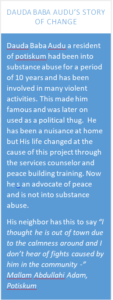 youth network (Youth Peace Platform) in Potiskum, Yobe state Nigeria. (STATUS: Ongoing)
youth network (Youth Peace Platform) in Potiskum, Yobe state Nigeria. (STATUS: Ongoing)
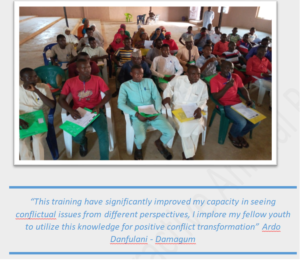
PROJECT AIM
The aim of the project is to engage youth actors to be positive agents for change in various communities capable of using Dialogue and Mediation skills to address emerging conflicts, build relationships across conflict divides and advocate to local and state duty bearers to adopt policies more considerate of the needs and concerns of the local population.
Objectives
- The project will empower about 100 youths in Fune (50) and Potiskum (50) particularly youths at risk of being drawn into violence so that they can play a central role in implementing and shaping solutions, to the different levels of conflicts faced in the community.
- Provide opportunities and socio-economic development for youths who are isolated or marginalized from societies, to avoid the likelihood of been influenced by a negative external force (militant groups, extremist, religious leaders, drugs).
- Empower the youths through training, mentoring and accompaniment which will help youths develop the capacity and confidence to analyze conflict, articulate their needs, facilitate dialogue, and engage local duty bears for a response that is more sensitive to community needs.
- Build on the gains made in peace building in Yobe state through stabilizing and supporting youths to become productive members of the society using a multipronged approach. So that this generation of youths will have the capacity to usher in sustainable/durable peace in their communities.
The Local government areas and communities that the project is being implemented are: Potiskum and Fune.
3.5 CR/HD/BIT/ETH Zurich: Smart Peace Project: Improving relationships between communities and persons associated with Boko-haram and militias, and among militia groups in, Yobe state, Northeastern Nigeria. (STATUS: Ongoing)

The ongoing Boko Haram insurgency in North-East Nigeria has fueled and exacerbated deep inter- and intra-community tensions. In a region already beset by extreme poverty and insecurity, national and local
responses to the conflict including the issue of re-integrating former combatants and those associated with Boko Haram has generated widespread mistrust and fear amongst the various stakeholders.
AIM OF THE PROJECT:
This project aims to build the capacity of people and communities affected by, or at risk of violent conflict to better support and manage change peacefully.
OBJECTIVES
- To improve relationships between communities and ex-combatants / militias and those associated with armed groups, and among militia groups.
- To improve collaboration and communication between different levels of government, and between government, militias and communities.
The Local Government areas and communities that this project is being implemented are:
- Fune: Dogon Kuka and Daura
- Geidam: Anguwar Kwari and Kasuwan Shanu
- Damaturu: Ajari and Pompomari
- Potiskum: Sabon Tasha (Afghanistan)
- Gujba: Kasachia and Railway
About the implementing organizations: Hope Interactive (HI) and Conciliation Resources (CR):
Hope Interactive (HI) is a Non-Governmental Organization registered with the Cooperate Affairs Commission (CAC) in Nigeria since 2004 with the sole aim of promoting a healthy, fair and sustainable future for all the people of Nigeria by eradicating poverty and improving the quality of life through capacity building in various spheres of human development.
Conciliation Resources (CR) is an independent registered UK Charity Peace Building Organization working with people in conflict to prevent violence and promote peace by empowering and building the capacity of marginalized groups, including youth, women and providing advice, support and practical resources to help communities resolve differences and working together to end conflicts.
3.6 Women Mediators across Commonwealth: (STATUS: Completed)
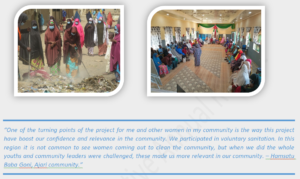
Women are essential to sustaining peace, in fact, the global study on the implementation of united nations security council resolution 1325 found that peace processes are more durable and last longer (https://www.peacewomen.org). To this end, Conciliation Resources an implementing donor, have been working to support a new network of women mediators (Women Mediators Across the Commonwealth WMC Network) to increase the participation of women in peace processes and mediation at a local, national and global level. This new network of women mediators brings women from different backgrounds and with different experiences of mediating conflict to learn from each other. The network also advocates for greater recognition of the crucial work done by women mediators at all levels. Hence the project (WMC Project) implemented by Hope Interactive and a Sister organization University of Maiduguri Muslim Women Association (UMMWA). These Activities were implemented with over 600 women in 12 communities in Yobe state, these women shared their stories to support and empower each other. These sessions helped to build the capacities of women to engage in peace processes in their communities, speak up and demand for change in the behavior and attitude of other community members, gatekeepers, government and security officials towards the issues of women. A lot of these women now volunteered towards peace- and decision-making processes/initiatives, contribute to community growth and safety. It is on the legacy of this project that Ra’ayin mata was founded.
3.7 Accountability and Advocacy in Malaria Intervention (ACOMIN; STATUS: Ongoing)
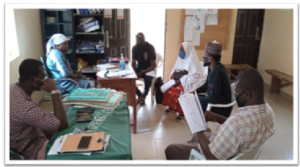
Key Informant Interview (KII) at PHC Maisandari with the Facility Head
As part of national effort to address the challenges of Malaria in Nigeria, Catholic Relief Services (CRS) and Civil Society in Malaria Control, Immunization and Nutrition (ACOMIN) are working together for the successful implementation of the Global Fund Supported Malaria project on Accountability and Governance. The project goal is to contribute towards reducing the malaria burden to pre-elimination levels and bringing malaria-related mortality to zero.
Hope Interactive in partnership with ACOMIN is implementing the project Accountability and Advocacy in malaria intervention in Damaturu LGA covering Three (3) wards namely Kukareta, Maisandari and Njiwaji-Gwange wards.
The objectives of the Accountability and Advocacy in Malaria Intervention are:
- To conduct Focused Group discussions at the ward level in order to create awareness on malaria and to identify issues/challenges regarding the quality of malaria services at the nearest facility to the community in question.
- To conduct Client Exit interviews at GF supported health facilities within our coverage by CATs members
- To Support local government level advocacy visits to stakeholder so as to address challenges/issues identified at the community and the facility.
Persons responsible are the Community Accountability Team (CAT) members consisting of Ward Development Committee (WDC) community representative and the Program Officer. And the target audience
are Community stakeholders, key community groups, Pregnant Women, Children under 5 years, Internally Displaced Population and General Population.
Success stories/Outcomes
We have been able to bridge the communication gap between the Facility heads and the RBM manager for the LGA Mal. Adamu Bulama through our Advocacy visits which made him to discover that for the past three (3) months RDT kit have not been supplied to MCH Njiwaji-Gwange. “If not for your coming today I wouldn’t have known this he affirms.”
We identified the issue of late coming of facility staff on morning and evening duties at MCH Njiwaji-Gwange and related to the facility head where she took the issue to the PHC Management Board and supervisors have been sent to the facility and six (6) staff have been queried on account of that and there has been a great improvement thus far.
3.8 Eid el-fitr outreach to orphans and vulnerable children in Yobe state: Yetim Care Foundation Damaturu (STATUS: Completed)
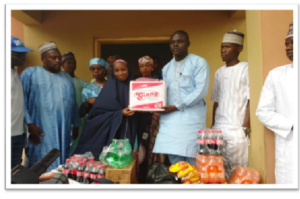
In response to the plight of Orphans and vulnerable children in Yobe state, Hope Interactive has taken a robust step to provide succor to these vulnerable children at YETIM Care Foundation through the provision of psychosocial support, food items and educational materials. Over the years, children particularly in Northeast Nigeria have increasingly becoming defenseless owing to the incessant killings of men and female households by the Boko Haram and ISIS-WA across Yobe, Borno and Adamawa states. Consequently, children have become more vulnerable and are been lured into drug abuse, trafficking, early prostitution, street hawking/peddling and terrifyingly recruited into armed groups and potentially nurtured for political thuggery.
However, some of the psychosocial support rendered include; sporting competition, structured arithmetic games and counseling sessions. Through this intervention, over hundred youth have directly benefited from
the educational materials; as it is meant to boost their intellectual capacity by encouraging/giving them sense of belonging and social inclusion.
Output/Outcome:
Over one hundred vulnerable children have received psychosocial support, food items and educational materials at the YETIM Care Foundation. The children are becoming socially stable and have sense of belonging as a result of the psychosocial support and other items delivered.
4.0 LIVIA PEACE HOUSE
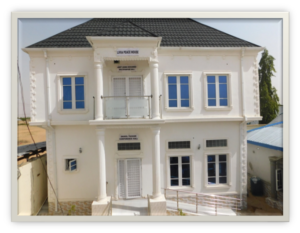
This edifice is reminiscent of the Livia international peace award, known as the Livia Peace House, which houses Janet Adama Mohammed multipurpose hall and Daniel Tucker Conference hall. The award was given to Hope interactive for acting bravely and wisely in the painful and violent conflicts of Nigeria. For building peace and justice through courageous and nonviolent conflict transformation. For building broad-based
coalitions across different communities affected by violence. Hope interactive was honored with this award for bringing the contending parties together for contact, dialogue, and mediation and taking great risks of bridging the gap, acknowledging the well thought and creative measures used by Hope Interactive to raise awareness of the possibilities of constructive conflict resolution and peace building. This edifice was founded on the Livia international peace award, geared towards promotion of dialogue, mediation, creation of listening/safe spaces, counseling of at risk youth and conflict resolution.
4.1 Community Development Projects
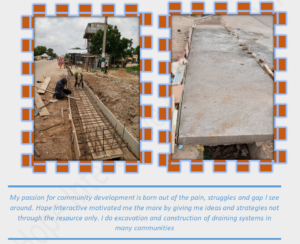
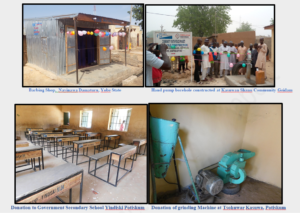
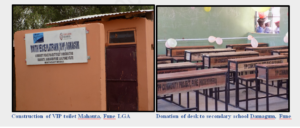
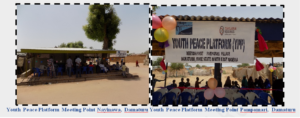
Youth peace fund is Hope interactive’s initiative to support youth’s ideas within their communities to ultimately strengthen social bond and cohesion among youth. The project is focused on meeting immediate need of some communities and mentoring young men and women on how to manage small peace projects. The projects are completely handled by the youths as it is HI’s way of building their capacities since they have been trained on how to handle small projects for peace. The ideas for this projects were conceived and implemented by the young peace advocates across the target areas (Damaturu, Potiskum, Fune and Gaidam). In all, Hope interactive has implemented 20 community projects in 20 communities in Yobe state.
5.0 Financial Statement/ Performance
The year 2019 (April) started well but along the line Covid-19 came up and affected most of activity implementation. One of the organizational wide responses to the seeking of funds was the revision of 2019- 2020 plans and budgets in anticipation of reduction in both sponsorship and partnership income performance. While this affected the income performance. Below is a table showing a summation of income and expenses incurred.
5.1 Income and Expenditure in the Year 2019/2020
| INCOME |
| Source |
Amount (N) |
| Foundations/Agencies |
153,488,062.55 |
| Counterpart contributions |
3,500,000 |
| Individual contributions |
500,000 |
| In-kind support |
11,000,000 |
| Investment income |
650,000 |
| Total |
169,138,062.55 |
| EXPENDITURE |
| Items |
Amount (N) |
| Salaries/wages |
26,780,000 |
| Insurance / Tax |
7,674,403.13 |
| Consultants/professional fees |
4,250,000.00 |
| Programme activities |
125,894,659.42 |
| Travels |
1,256,000 |
| Equipment/supplies |
1,280,000 |
| Communications (telephone, internet & postage) |
968,000 |
| Rents & Utilities |
785,000 |
| Others (benefits & audits) |
250,000 |
| Total |
169,138,062.55 |
| FIXED ASSETS |
| Items |
Amount (N) |
| Furniture and fittings |
2,350,000 |
| Electronics |
2865,000 |
| Office Building |
17,795,000 |
| Vehicle |
2,450,000 |
| Total |
25,460,000 |
8.0 Challenges and Lessons Learned
Gleaning from activity development, planning, implementation and monitoring, Hope interactive encountered a couple of challenges cutting across economic meltdown, covid-19 lockdown and insecurity.
In the last quarter of 2019, the security situation worsened, with ISIS-WA on the north (Geidam/Yunusari axis) and Shekau on the south (Gujba/Gulani axis), which made project implementation a bit difficult. So many times, HI staff had to travel over 400 kilometers to avoid paths ISIS-WA are sighted always, which brought delays in activity implementation. There have been numerous incursions by ISIS-WA and Boko-haram in linear settlements by the highway. Military bases have been dislodged, community members displaced, economic activities disrupted and lives taken in this period.
The covid-19 pandemic was a major challenge for both local and international organizations. There was lockdown of state borders, closure of schools, government offices even though movement was not restricted internally in the state. Hope interactive had to cut down the number of participants during activity implementation and also numbers of staff traveling for activities since not more than four people are allowed to travel in a car. Secondary effects of the covid-19 lockdown includes SGBV, child defilement/rape, shop-lifting, abduction which has also impacted on life within communities and hence activity implementation. There was a rapid increase in the cost of commodities and hence cost of transportation. In fact, the covid-19 lockdown and financial constraint reinforced each other in a positive feedback mechanism.
Lessons learned in this fiscal year is that humanitarian, development and peace building programs constitute a tripod that reinforce each other in a positive feedback mechanism. Absence of one makes the political, economic and social atmosphere lose balance.
Board of Directors Senior Management Team (SMT)
Danladi A. Barka Mshelia Birma
Dr. Philip Wayuta Danladi A. Barka
Mshelia Birma Ishaku Demba
Joy John Oyema Andrew Wayuta
Kudirat Kashim Adamu Sikwati
Ibrahim Birma
8.01 Acknowledging our Institutional/technical/implementation partners
We wish to acknowledge our partners for providing us with an all-round support, without which such projects wouldn’t have been successful.
- Conciliation Resources (CR); our strategic partner
- Northeast Regional Initiative (NERI)/Creative Associates International
- USAID/Office of Transition Initiatives (OTI)
- National Endowment for Democracy (NED)
- British Council (BC)
- Catholic Relief Services (CRS)
- Department for International Development (DFID)
- Accountability and Advocacy project in Malaria Intervention (ACOMIN)
- SIDA
- LEOSA
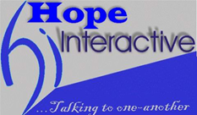

SUMMARY/CONTENT
MESSAGE FROM THE EXECUTIVE DIRECTOR
Dear Friends and Partners,
With a thankful heart, I present to you the 2019-2020 annual report of Hope interactive (HI). It is a moment to reflect upon the hard work of our staff to ensure delivery of services and implementation of activities within the fiscal year despite the security challenge and public health emergency. We are greatly honored to have worked in Damaturu, Potiskum, Fune, Geidam and Gujba LGAs of Yobe state focusing on peace building, CVE, OVC, humanitarian and development projects. In the last quarter of 2019, the security situation worsened, with ISIS-WA on the north (Geidam/Yunusari axis) and Shekau on the south (Gujba/Gulani axis), which made project implementation a bit difficult. However, with careful planning, HI was able to implement every beat of activity as planned.
It is a moment to reflect upon the hard work of our staff to ensure delivery of services and implementation of activities within the fiscal year despite the security challenge and public health emergency. We are greatly honored to have worked in Damaturu, Potiskum, Fune, Geidam and Gujba LGAs of Yobe state focusing on peace building, CVE, OVC, humanitarian and development projects. In the last quarter of 2019, the security situation worsened, with ISIS-WA on the north (Geidam/Yunusari axis) and Shekau on the south (Gujba/Gulani axis), which made project implementation a bit difficult. However, with careful planning, HI was able to implement every beat of activity as planned.
Hope Interactive made a couple of strides in capacity building for community members, dowsing community tensions, supporting community projects through NYSC CDS groups/individuals, implementations of youth peace community projects and construction of LIVIA peace house, which houses Janet Adama Mohammed multipurpose hall and Daniel Tucker conference hall, which is reminiscent of the Livia peace award geared towards promotion of dialogue, mediation, creation of listening/safe spaces, counseling of at risk youth and conflict resolution.
The covid-19 pandemic emerged and slowed down activity implementation. However, because Yobe state was not locked down completely, activity implementation was scaled and slowed down to ensure that staffs are well protected. Hope interactive provided all of its five teams with a hand wash station and ensured the use of digital infrared thermometers, hand gloves, face masks and practicing of social distancing.
Hope Interactive had the privilege of completing phase two of its project known as “Peace by the people”, funded by the Federal foreign office (FFO), Republic of Germany. Special thanks to the FFO and CR for such a robust support. We afterwards conducted an independent evaluation of the project which overall was mind blowing. This is perhaps the largest peace building project implemented in the state and possibly the northeast. A hybrid of community youth projects and peace building initiative was unique and provided a wonderful blend of activities that further concretized community cohesion and trust building. Secondly, Hope Interactive officially completed its project known as Northeast Humanitarian consortium, which was a self-funded project and has been impacted vulnerable women and children in Yobe and Adamawa states respectively.
Hope Interactive has worked with MDA’s, traditional and religious leaders, gate keepers, duty bearers to conduct research, dialogues, advocacies, mediations, symposiums/colloquiums, policy events, validation and consultative workshops, outreaches, street walks/sensitization, campaigns, youth networking, call-in radio programs, TV talk shows, youth-led peace learning exchange; mentoring, protection and legal support for vulnerable children, educational support, health/hygiene sensitization, capacity building on life skills; trauma healing through arts (Musical art, theater arts and fine arts) through which we have reached out to over 55,000 citizens ranging from young people (male and female), men, women and children.
We remain resolutely committed to end thirst and hunger, to conquer poverty and disease, to banish illiteracy and massive human misery through building peace and providing humanity with the right to life with dignity.
Map of Yobe state showing Hope Interactive’s project sites/locations in red
Brief About Yobe State
Yobe, state, northeastern Nigeria borders the Republic of Niger to the north and the Nigerian states of Borno to the east, Gombe to the southwest, Bauchi to the west, and Jigawa to the northwest. Yobe state was created in 1991 from the western half of Borno state.
Yobe’s terrain consists of plains that are drained by the seasonal Komadugu Yobe River and its tributaries in the north and by the Gongola River in the south. The state’s vegetation is predominantly of the Sudan savanna type, with scattered acacia trees. There is also an area of Sahel savanna, consisting of sandy soils and thorn scrub, which is located in the far north. The Kanuri are the principal ethnic group in the state. Sorghum, millet, peanuts (groundnuts), cowpeas, corn (maize), sesame, and cotton are the primary crops. Cattle herding and farming are the chief occupations. Damaturu is the state capital, and Nguru, Potiskum, and Gashua are sizable market towns. The state is served by trunk roads connecting Potiskum, Damaturu, and Maiduguri (in Borno state) with a Population of (2006) 2,321,591.
Context
Humanitarian:
Humanitarian needs in Yobe State increased marginally during the reporting period, mainly as a result of an upsurge in attacks by non-state armed groups (NSAG) and clashes between them and government forces displacing local populations. Hazards affecting civilian populations include improvised explosive devices and unexploded ordinance, flash flooding, and COVID-19 pandemic. Flash flooding and windstorms destroyed
nearly 400 houses, six public facilities and claimed at least eight lives across the LGAs during the reporting period marking the onset of the rainy season. (OCHA 30th June, 2020)
Conflict dynamics:
Conflict continued in Yobe State, including NSAG attacks and clashes with government forces along the LGAs of Geidam and Gujba, bordering Borno State. The security situation in these LGAs remains unpredictable and volatile. Government forces continue to carry out operations and maintain a high level of alertness following NSAG activities across border LGAs. There is a significant increase in the threats of attacks on both civilian and military convoys, abduction/kidnapping (at illegal vehicle checkpoints), and IEDs along these routes. UXOs also pose a threat, with incidents reported in June in Gujba LGA, with the police issuing warning of widespread threats across the LGAs, particularly across farming areas. NSAG attacks were targeting civilian communities across Bursari, Geidam, Gujba LGAs, and abductions in Lantewa, Tarmuwa LGA along the Damaturu – Babangida road. An attack in Buni Gari (27/04/2020), Gujba LGA, resulted in the burning down of activity centers of some humanitarian actors in the community, which triggered a temporary suspension of operations. A similar attack was recorded in Dapchi, Bursari LGA (18/05/2020), where NSAG operatives burned down houses and public buildings, and also looted medical supplies from the health facility. Aid operations in Geidam LGA (19/05/2020) also recorded some disruptions following a spike in NSAG attacks and clashes. (OCHA 30th June, 2020)
DESCRIPTION OF THE ORGANIZATION
1.1 About Hope Interactive (HI)
Founded in 2001, Hope Interactive is a Non-Governmental Organization established basically to combat abject poverty by promoting an environment for sustainable human development. It is popularly known with the acronym (HI) and primarily focuses in various life changing programmes for poor neighborhoods wherever there is a need.
1.2 Our Work
We work to end extreme poverty and enable resilient, democratic societies to realize their potential through promoting quality of life of young men, women and other vulnerable groups at the community level.
1.3 Partnerships
Partnership is paramount in achieving progress to human and infrastructure development. Hope Interactive over the years have successfully implemented many programme with I/NGOs and agencies such as CR, SIDA, HD/BIT/ETH Zurich, NED, ACOMIN/CRS, BC, NERI, DFID.
1.4 Our Vision
Our vision amongst others is to promote a healthy, fair and sustainable future for all the people of Nigeria by alleviating poverty and improving the quality of life through capacity building in various spheres of human development.
1.5 Mission Statement
Hope Interactive is committed to the promotion of innovative approach to positive human development, and behavior pattern through interaction and exchange of values and ideas.
1.6 Objectives
1.7 Our Activities
1.8 Strategies used
This creates an avenue to work at grassroots with local communities with a view to help them identify their own needs. The idea also encourages local ownership of projects, mobilize the populace for implementation of projects, raise profiles of community-based organizations, and other local NGO’s.
2.0 Our contacts
2.1 North-east Zonal Coordinator & Executive Director [MSHELIA W. BIRMA]
Yobe Office: No. 3, Malari bye-pass, behind ECWA Good news church, Damaturu, Yobe State, Nige
Phone no.: +234-8065658943 Email: msheliawayutabirma34@gmail.com
2.2 North West Zonal Coordinator & Executive Director [DANLADI AMA BARKA]
Kaduna Office: No.5, Hanwa new extension, off Zaria-Kaduna express road, Zaria, Kaduna State Nigeria
Phone no. : +234-8036126611 Email: amayankur@yahoo.com
3.0 Projects Realized in the Scope of Programmes
3.1 NED/CR: Ra’ayin Mata: The voice of women in Northeast Nigeria (January 2020; STATUS: Ongoing)
Whilst everyone’s life in northeast Nigeria has been affected by the widespread violence for the past ten years, people’s experiences have varied across all aspects of an individual’s social identity (ethnicity, religion, socio-economic status, age, (dis)ability, sexual orientation or gender). However, experiences of the conflict have particularly differed along gendered lines.
The marginalization of women therefore, makes them vulnerable to being drawn into the violence as it can be viewed as an opportunity to advance their freedoms and reduce their family’s hardship. Many women have legitimate grievances, and without access to productive and peaceful forums to raise and resolve their concerns, violent pathways can seem like an attractive, if not the only, means to demand change. Furthermore, the growing mistrust and suspicion of women as potential sources of insecurity only serves to further ostracize them making them even more vulnerable to being mobilized to undertake violence.
Project Objectives
Output/Outcome:
Formation of a network; Women for Peace (WFP) to support mothers to mentor young girls and empowering at risk girls and the community at large in Yobe State.
3.2 Building the capacity of youth to prevent and respond positively to violence: Peace by the People: Formation of YPP (STATUS: Completed)
Peace by the People: strengthening the capacity of youth to prevent and respond to violent conflict in northeast Nigeria.
OBJECTIVES
In Yobe State, youth are identified as the premise for lasting peace and subsequent sustainability of tranquility in our society. This is because they are the ones who will transform their communities into a more secure and productive neighborhood. To these courses, Hope Interactive with support from Conciliation Resources is implementing a project “peace by the people” to strengthen the capacity of youth to prevent and respond to violent conflict in four communities of Yobe state. The Local government areas and communities that the project is being implemented are:
In concrete terms, the project activity entails the creation of a youth network that will be committed to pursuing non-violent alternative by the formation of a Youth Peace Platform (YPP) in each of the four communities.
Output/Outcome:
3.4 MCN Programme/British Council Nigeria: Managing conflict in northeast Nigeria: Formation of a youth network (Youth Peace Platform) in Potiskum, Yobe state Nigeria. (STATUS: Ongoing)
youth network (Youth Peace Platform) in Potiskum, Yobe state Nigeria. (STATUS: Ongoing)
PROJECT AIM
The aim of the project is to engage youth actors to be positive agents for change in various communities capable of using Dialogue and Mediation skills to address emerging conflicts, build relationships across conflict divides and advocate to local and state duty bearers to adopt policies more considerate of the needs and concerns of the local population.
Objectives
The Local government areas and communities that the project is being implemented are: Potiskum and Fune.
3.5 CR/HD/BIT/ETH Zurich: Smart Peace Project: Improving relationships between communities and persons associated with Boko-haram and militias, and among militia groups in, Yobe state, Northeastern Nigeria. (STATUS: Ongoing)
The ongoing Boko Haram insurgency in North-East Nigeria has fueled and exacerbated deep inter- and intra-community tensions. In a region already beset by extreme poverty and insecurity, national and local
responses to the conflict including the issue of re-integrating former combatants and those associated with Boko Haram has generated widespread mistrust and fear amongst the various stakeholders.
AIM OF THE PROJECT:
This project aims to build the capacity of people and communities affected by, or at risk of violent conflict to better support and manage change peacefully.
OBJECTIVES
The Local Government areas and communities that this project is being implemented are:
About the implementing organizations: Hope Interactive (HI) and Conciliation Resources (CR):
Hope Interactive (HI) is a Non-Governmental Organization registered with the Cooperate Affairs Commission (CAC) in Nigeria since 2004 with the sole aim of promoting a healthy, fair and sustainable future for all the people of Nigeria by eradicating poverty and improving the quality of life through capacity building in various spheres of human development.
Conciliation Resources (CR) is an independent registered UK Charity Peace Building Organization working with people in conflict to prevent violence and promote peace by empowering and building the capacity of marginalized groups, including youth, women and providing advice, support and practical resources to help communities resolve differences and working together to end conflicts.
3.6 Women Mediators across Commonwealth: (STATUS: Completed)
Women are essential to sustaining peace, in fact, the global study on the implementation of united nations security council resolution 1325 found that peace processes are more durable and last longer (https://www.peacewomen.org). To this end, Conciliation Resources an implementing donor, have been working to support a new network of women mediators (Women Mediators Across the Commonwealth WMC Network) to increase the participation of women in peace processes and mediation at a local, national and global level. This new network of women mediators brings women from different backgrounds and with different experiences of mediating conflict to learn from each other. The network also advocates for greater recognition of the crucial work done by women mediators at all levels. Hence the project (WMC Project) implemented by Hope Interactive and a Sister organization University of Maiduguri Muslim Women Association (UMMWA). These Activities were implemented with over 600 women in 12 communities in Yobe state, these women shared their stories to support and empower each other. These sessions helped to build the capacities of women to engage in peace processes in their communities, speak up and demand for change in the behavior and attitude of other community members, gatekeepers, government and security officials towards the issues of women. A lot of these women now volunteered towards peace- and decision-making processes/initiatives, contribute to community growth and safety. It is on the legacy of this project that Ra’ayin mata was founded.
3.7 Accountability and Advocacy in Malaria Intervention (ACOMIN; STATUS: Ongoing)
Key Informant Interview (KII) at PHC Maisandari with the Facility Head
As part of national effort to address the challenges of Malaria in Nigeria, Catholic Relief Services (CRS) and Civil Society in Malaria Control, Immunization and Nutrition (ACOMIN) are working together for the successful implementation of the Global Fund Supported Malaria project on Accountability and Governance. The project goal is to contribute towards reducing the malaria burden to pre-elimination levels and bringing malaria-related mortality to zero.
Hope Interactive in partnership with ACOMIN is implementing the project Accountability and Advocacy in malaria intervention in Damaturu LGA covering Three (3) wards namely Kukareta, Maisandari and Njiwaji-Gwange wards.
The objectives of the Accountability and Advocacy in Malaria Intervention are:
Persons responsible are the Community Accountability Team (CAT) members consisting of Ward Development Committee (WDC) community representative and the Program Officer. And the target audience
are Community stakeholders, key community groups, Pregnant Women, Children under 5 years, Internally Displaced Population and General Population.
Success stories/Outcomes
We have been able to bridge the communication gap between the Facility heads and the RBM manager for the LGA Mal. Adamu Bulama through our Advocacy visits which made him to discover that for the past three (3) months RDT kit have not been supplied to MCH Njiwaji-Gwange. “If not for your coming today I wouldn’t have known this he affirms.”
We identified the issue of late coming of facility staff on morning and evening duties at MCH Njiwaji-Gwange and related to the facility head where she took the issue to the PHC Management Board and supervisors have been sent to the facility and six (6) staff have been queried on account of that and there has been a great improvement thus far.
3.8 Eid el-fitr outreach to orphans and vulnerable children in Yobe state: Yetim Care Foundation Damaturu (STATUS: Completed)
In response to the plight of Orphans and vulnerable children in Yobe state, Hope Interactive has taken a robust step to provide succor to these vulnerable children at YETIM Care Foundation through the provision of psychosocial support, food items and educational materials. Over the years, children particularly in Northeast Nigeria have increasingly becoming defenseless owing to the incessant killings of men and female households by the Boko Haram and ISIS-WA across Yobe, Borno and Adamawa states. Consequently, children have become more vulnerable and are been lured into drug abuse, trafficking, early prostitution, street hawking/peddling and terrifyingly recruited into armed groups and potentially nurtured for political thuggery.
However, some of the psychosocial support rendered include; sporting competition, structured arithmetic games and counseling sessions. Through this intervention, over hundred youth have directly benefited from
the educational materials; as it is meant to boost their intellectual capacity by encouraging/giving them sense of belonging and social inclusion.
Output/Outcome:
Over one hundred vulnerable children have received psychosocial support, food items and educational materials at the YETIM Care Foundation. The children are becoming socially stable and have sense of belonging as a result of the psychosocial support and other items delivered.
4.0 LIVIA PEACE HOUSE
This edifice is reminiscent of the Livia international peace award, known as the Livia Peace House, which houses Janet Adama Mohammed multipurpose hall and Daniel Tucker Conference hall. The award was given to Hope interactive for acting bravely and wisely in the painful and violent conflicts of Nigeria. For building peace and justice through courageous and nonviolent conflict transformation. For building broad-based
coalitions across different communities affected by violence. Hope interactive was honored with this award for bringing the contending parties together for contact, dialogue, and mediation and taking great risks of bridging the gap, acknowledging the well thought and creative measures used by Hope Interactive to raise awareness of the possibilities of constructive conflict resolution and peace building. This edifice was founded on the Livia international peace award, geared towards promotion of dialogue, mediation, creation of listening/safe spaces, counseling of at risk youth and conflict resolution.
4.1 Community Development Projects
Youth peace fund is Hope interactive’s initiative to support youth’s ideas within their communities to ultimately strengthen social bond and cohesion among youth. The project is focused on meeting immediate need of some communities and mentoring young men and women on how to manage small peace projects. The projects are completely handled by the youths as it is HI’s way of building their capacities since they have been trained on how to handle small projects for peace. The ideas for this projects were conceived and implemented by the young peace advocates across the target areas (Damaturu, Potiskum, Fune and Gaidam). In all, Hope interactive has implemented 20 community projects in 20 communities in Yobe state.
5.0 Financial Statement/ Performance
The year 2019 (April) started well but along the line Covid-19 came up and affected most of activity implementation. One of the organizational wide responses to the seeking of funds was the revision of 2019- 2020 plans and budgets in anticipation of reduction in both sponsorship and partnership income performance. While this affected the income performance. Below is a table showing a summation of income and expenses incurred.
5.1 Income and Expenditure in the Year 2019/2020
8.0 Challenges and Lessons Learned
Gleaning from activity development, planning, implementation and monitoring, Hope interactive encountered a couple of challenges cutting across economic meltdown, covid-19 lockdown and insecurity.
In the last quarter of 2019, the security situation worsened, with ISIS-WA on the north (Geidam/Yunusari axis) and Shekau on the south (Gujba/Gulani axis), which made project implementation a bit difficult. So many times, HI staff had to travel over 400 kilometers to avoid paths ISIS-WA are sighted always, which brought delays in activity implementation. There have been numerous incursions by ISIS-WA and Boko-haram in linear settlements by the highway. Military bases have been dislodged, community members displaced, economic activities disrupted and lives taken in this period.
The covid-19 pandemic was a major challenge for both local and international organizations. There was lockdown of state borders, closure of schools, government offices even though movement was not restricted internally in the state. Hope interactive had to cut down the number of participants during activity implementation and also numbers of staff traveling for activities since not more than four people are allowed to travel in a car. Secondary effects of the covid-19 lockdown includes SGBV, child defilement/rape, shop-lifting, abduction which has also impacted on life within communities and hence activity implementation. There was a rapid increase in the cost of commodities and hence cost of transportation. In fact, the covid-19 lockdown and financial constraint reinforced each other in a positive feedback mechanism.
Lessons learned in this fiscal year is that humanitarian, development and peace building programs constitute a tripod that reinforce each other in a positive feedback mechanism. Absence of one makes the political, economic and social atmosphere lose balance.
Board of Directors Senior Management Team (SMT)
Danladi A. Barka Mshelia Birma
Dr. Philip Wayuta Danladi A. Barka
Mshelia Birma Ishaku Demba
Joy John Oyema Andrew Wayuta
Kudirat Kashim Adamu Sikwati
Ibrahim Birma
8.01 Acknowledging our Institutional/technical/implementation partners
We wish to acknowledge our partners for providing us with an all-round support, without which such projects wouldn’t have been successful.